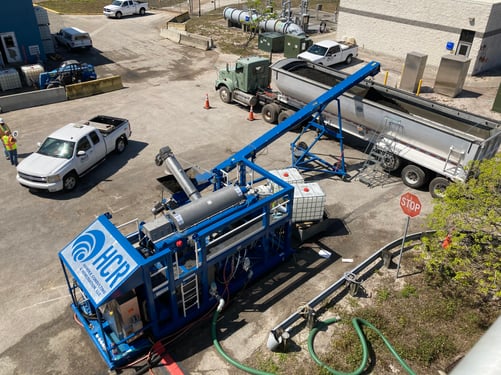
When it comes to sludge dewatering, there are various technologies to choose from. But trying to decide which technology is right for your operation can be a daunting task. From centrifuges, filter presses, and geomembranes the options are endless. In this article, we will be taking a deeper look into centrifuges and how you can decide if they are the right technology for your sludge dewatering project.
What is Sludge Dewatering?
Sludge dewatering separates sludge into liquid and solid components for waste minimization. It is important to note that dewatering is not intended to treat the sludge or liquid, it only separates the solid and liquid components so that it is easier and more cost-effective to handle the separate phases for final disposal. Once the sludge has been dewatered, both the solid and liquid components may contain contaminants that need to be treated separately.
Sludge dewatering is typically focused on reducing the weight and volume of the sludge so that disposal, including transportation, costs are kept to a minimum. Water removal is the primary means of volume reduction. Before sludge waste can be treated or disposed of in the most economical manner, dewatering is necessary.
What is a Centrifuge?
A centrifuge relies on centrifugal force - the same that a spinning top uses to stay upright - to separate materials by their densities. Centrifuges are used for many applications from the manufacturing of pharmaceuticals to separating cream from milk along with many other industrial uses including sludge dewatering. When using a centrifuge for separation, the materials with greater densities will be displaced further away from the axis than materials with lesser densities. In the case of whole milk, the cream will end of up “spinning” out of the milk, hence, creating a separation of material with different densities. There are many types of centrifuges in use for a multitude of applications.
Like any piece of equipment, there can be advantages and disadvantages.
Advantages of Centrifuge
- Lower maintenance and operation costs.
- Reduced Processing Time
- Fast Commissioning and start-up
- Size versatility
- Higher throughput capacity
- Maintenance repair can be done easily, as items can be easily removed and replaced.
- Centrifuges are easy to clean
- While centrifuges require an experienced operator running them, they require minimal operator attention when operations are stable
- Centrifuges provide low exposure to aerosols, pathogens, hydrogen sulfide, and other odors
- Transportation and disposal costs are lower
Disadvantages of Centrifuge
- Replacement parts are expensive and internal parts can be worn down easily
- High noise and vibration
- High energy consumption
- High Equipment Capital Cost
Is a Centrifuge Right for My Sludge Dewatering Project?
Particle size, density, material viscosity, and force needed (for separation as a function of rotation speed) are some of the factors to be considered when deciding if centrifuging is the optimal choice for your sludge dewatering needs and, if so, what kind of centrifuge. In many instances, the performance of a centrifuge is enhanced using polymers to help with the separation.
It is important to consider the overall objective, disposal options, and cost of dewatering in deciding which the best choice for your specific needs is.
At Handex we provide our clients support in making these decisions utilizing our highly experienced dewatering professionals and bench-scale treatability capabilities in evaluating a variety of technologies to choose the optimal solution.
About Handex
Handex is a provider of Pumping, Dredging, Sludge Dewatering, and Treatment of industrial and process wastes. Our staff includes experienced Project Managers, Engineers, Operators, Technicians, Fabricators, Scientists, Mechanics, and Health and Safety Professionals. Our objective is to meet and exceed client expectations while providing quality, safe and cost-effective services. In some cases, our clients find that the value of the materials returned to the plant pays partially for the cost of the sludge dewatering service.
For more information about industrial dewatering services, we can provide for your site, request a free quote, or contact us.
Originally published September 22, 2016, updated August 25, 2021.


